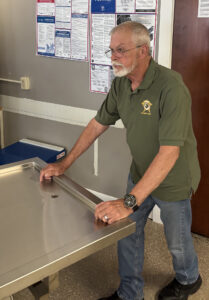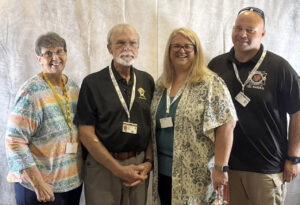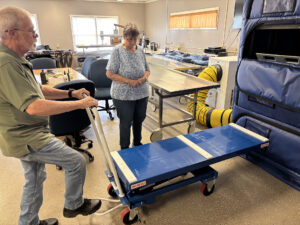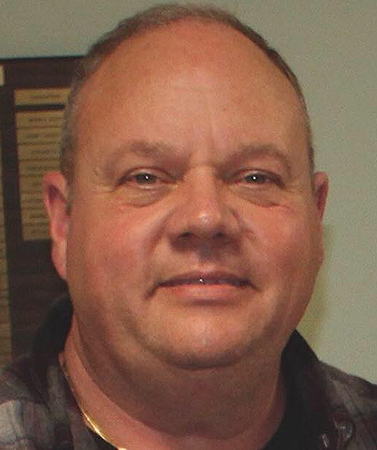
MORGAN COUNTY — The room where the deceased are kept is noticeably cooler than the rest of the coroner’s office. On the way in, Mike Ellis hunches over, and with a grin begins to lurch toward the door.
“Do you know Igor?” Ellis says in an exaggerated voice, and enters the room.
Inside are a couple surgical tables, a giant steel refrigerator and shelves of what Ellis calls “parts” — small bottles containing tiny pieces of heart, lungs, liver and more of the little things that make human beings tick.
Parts, obviously, are collected from the people no longer ticking.
But there’s no one like that in the coroner’s office today, and The Correspondent caught up with Ellis on a day when he thankfully wasn’t busy. The Morgan County Coroner — recently awarded Indiana’s Coroner of the Year by the Indiana Coroner’s Association — had finished all of his current paper work, and was simply waiting in his office with his wife, Debbie, who serves as the deputy coroner.
Waiting is actually a big part of the job. The coroner is pretty much on the clock 24/7, as people are constantly dying outside of work hours.
Once, Debbie had spent all day preparing a roast beef, complete with potatoes, carrots, the works, when Ellis got a call.
“We gotta go,” he said to her, just as she pulled dinner from the oven.
They didn’t return home for another six hours, and the roast went straight into the trash.
They laugh about this now, which says a lot about the human capacity for endurance. It’s remarkable they even remember this story, given that it happened on a day spent recovering a dead body and investigating what happened, the kind of thing that might totally consume the memories of anyone else.
But Ellis is used to having his meals ruined. He’s been a “death investigator” since 2012 when the then-coroner asked him to be his deputy, and his first case on the job was appropriately difficult.
It was a suicide. The dead man first set fire to his bedroom, and then used multiple guns to finish himself off before the fire could.
“How do you handle something like that?”
“You cry,” Ellis says.
He cried on that day in 2012, and he almost cries again when he’s telling the story. Ellis isn’t ashamed to cry. He can’t be — he wouldn’t be able to do his job if he was.
In the next breath, though, he’s telling another joke, because that’s also how he’s able to press on in his 13th year in the coroner business.
Ellis was initially hesitant to participate in this story, saying he doesn’t like to glorify himself. But eventually he agreed to talk about himself and his work, probably in part because talking is the middle stage between crying and laughing. Ellis is critical of the traditional masculine trait of bottling everything up, and pretending it means you’re a tough guy.
No, a real man does the job, cries afterward, talks about it, and is then free to laugh. Rinse and repeat, for more than a decade. And so, Ellis agreed to be interviewed.
“Everyone’s been dying to meet me,” he says, and his face says he’s told that one many times.
It always gets a laugh.

The hardest day
The coroner dates back to medieval England, and shares the same etymology as the word “crown.” This is doubly fitting, as the coroner was both a trusted officer of the Crown, and because the small matter of death involves everyone, from the lowest peasant to the king himself.
Ellis was elected coroner in 2020, and then again in 2024. He admits without hesitation it is the most difficult job he’s ever had.
Ellis was born in 1951 in Indianapolis; his wife was born two days later in a nearby hospital. He lived all over Central Indiana growing up, moving from place to place and working on farms with his father.
He would eventually attend Ball State University for two years, leaving after he had run out of money. Ellis then joined the Army in 1972, serving for five years doing military intel before being discharged.
Several odd jobs came after that, some longterm, others lasting only months. Ellis has worked as an electrician, a photojournalist, and even served as a pastor for five years. Before becoming Morgan County’s deputy coroner in 2012, Ellis had for many years worked as a paramedic, a job he got so he could “help people.”
But most occupations help others in some way — baristas make delicious coffee every morning, teachers impart wisdom to children, reporters expose corrupt politicians. Most jobs meet a need of some kind. So, why did Ellis want to help people as a paramedic, specifically?
“When people are hurting, when they’re dying, they aren’t thinking about all their little problems, you know, their bills and all that,” Ellis said. “Suddenly, all those things lose their significance because they don’t know if they’re gonna make it. In that moment, life is their ultimate need.”
Since 2012, though, Ellis has worked with the dead, not the dying, and the need he and his wife meet has changed. Once someone has passed on, the only people left to help are the ones left behind.
“We see people on the hardest day of their lives,” Debbie said. “Our job is to try and give families some kind of peace.”
It’s not easy to do. The mechanical aspects of the job aren’t that difficult — it only takes 40 hours of training to be a practicing coroner, and the job itself mostly involves things like documentation and taking photos.
The hard parts are all psychological. Preventable deaths — car accidents, drug overdoses, suicides — eat away at Ellis, and he always cries when a baby dies.
In a job with so much death, it’s hard not to think about his own, or the deaths of his loved ones. Ellis has come close to that good night a few times. He often thinks about juvenile pranks he pulled in his youth that could have gotten him killed, pranks that he’s seen get others killed. Much later in his life, he battled cancer and survived.
Now, working in his elder age, he comes across people on his table younger than him. Why are they there, and he’s still here?
“The only difference between me and them is that I’ve been lucky,” Ellis said. “So far.”

Perchance to dream
The final act of Shakespeare’s Hamlet begins with two gravediggers cracking jokes about the death of Ophelia at the end of the previous act. The gravediggers aren’t given proper names, but Shakespeare hands them appropriate identifiers within the text: First Clown, and Second Clown.
How else, but to laugh, is one to cope with the reality that we must all one day venture into that undiscovered country, never to return?
During an autopsy, a physician cuts open the body by making a U, or Y-shaped incision on the chest. But it doesn’t matter the shape of the cut — Ellis says that everybody smells awful, without fail, when their corpse is on the table.
“Imagine,” Ellis says, “that you are trapped in a bathroom with 10 other people who all have severe diarrhea. That’s what it smells like.”
It’s the total opposite of a, “You had to be there,” kind of joke.
Humor is as essential to the coroner trade as the fresh mint Neutrolene Ellis puts on his facemask before he observes each autopsy. Without it, he wouldn’t be able to go on.
“You can measure the health of any society by how busy the coroner is,” Ellis says.
It prompts the inevitable question: how busy are you?
“We have drug issues here in Morgan County,” Ellis says. “Depression is a big problem with some people, too.”
Ellis then relates the grisly story of a time he worked a case so difficult that he had to walk away from it for a moment to gather himself.

The body was a high school senior, so close to graduating and moving on in his life. He was found in his bedroom, along with bags of his own feces and bottles of urine. The kid hadn’t left his room for days, doing nothing but playing video games.
He died of a self-inflicted gunshot wound.
Whenever Ellis takes some time off — a necessity in his line of work, every once in a while — he likes to spend time alone in the woods. It’s one of the ways he copes. He doesn’t drink — he tried that once, and got so ill he never tried again — and he hasn’t smoked since 1998. There’s only so much he can do to not think about death.
“I cry a lot,” Ellis says. “And I call my kids. (Debbie) has my back, she takes care of me. And I pray a lot.”
Ellis and Debbie feel that God has called on them to do this work, but that doesn’t make it any easier. They both look forward to a better place to come after this one, a place where people no longer have to suffer.
Still, better not to rush what comes next. Both of them have many kids and grandkids they’d like to watch grow up.
The conversation ends there, and Ellis is unable to resist one last joke, though this one is a bit less morbid than the others.
“The next time we meet,” Ellis says, “Let’s not do it here at the morgue. Maybe we can get coffee or something. Just don’t show up on the table.”
We walked away laughing, because we’re both still alive.








